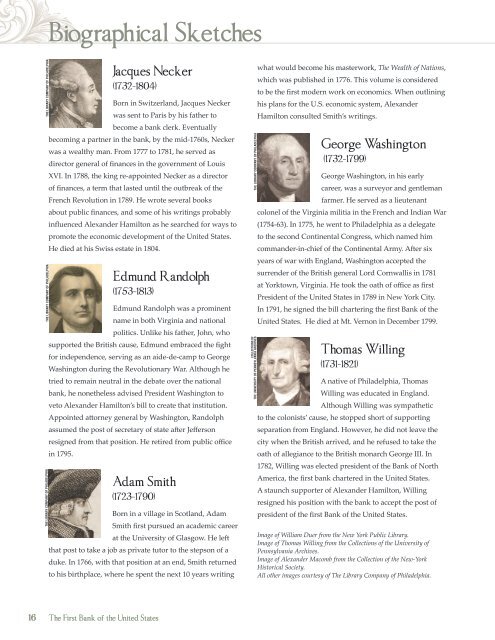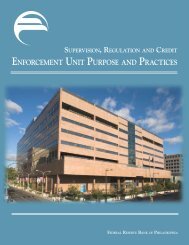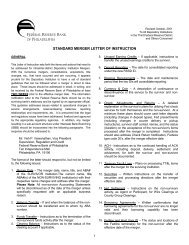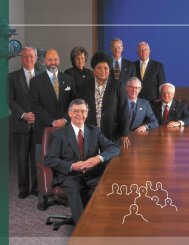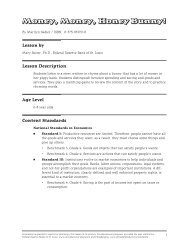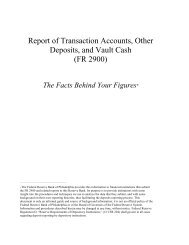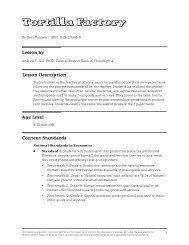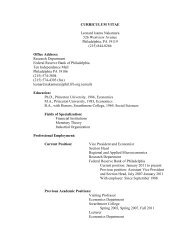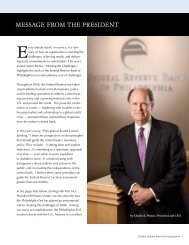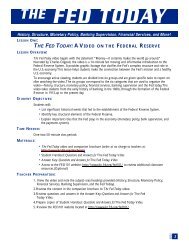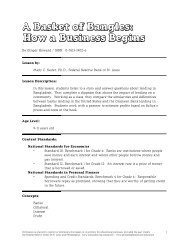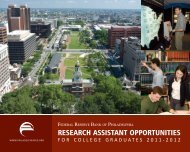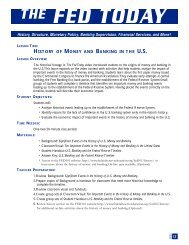The First Bank of the United States - Federal Reserve Bank of ...
The First Bank of the United States - Federal Reserve Bank of ...
The First Bank of the United States - Federal Reserve Bank of ...
Create successful ePaper yourself
Turn your PDF publications into a flip-book with our unique Google optimized e-Paper software.
16<br />
THE LIBRARY COMPANY OF PHILADELPHIA<br />
THE LIBRARY COMPANY OF PHILADELPHIA<br />
THE LIBRARY COMPANY OF PHILADELPHIA<br />
Biographical Sketches<br />
Jacques Necker<br />
(1732-1804)<br />
Born in Switzerland, Jacques Necker<br />
was sent to Paris by his fa<strong>the</strong>r to<br />
become a bank clerk. Eventually<br />
becoming a partner in <strong>the</strong> bank, by <strong>the</strong> mid-1760s, Necker<br />
was a wealthy man. From 1777 to 1781, he served as<br />
director general <strong>of</strong> finances in <strong>the</strong> government <strong>of</strong> Louis<br />
XVI. In 1788, <strong>the</strong> king re-appointed Necker as a director<br />
<strong>of</strong> finances, a term that lasted until <strong>the</strong> outbreak <strong>of</strong> <strong>the</strong><br />
French Revolution in 1789. He wrote several books<br />
about public finances, and some <strong>of</strong> his writings probably<br />
influenced Alexander Hamilton as he searched for ways to<br />
promote <strong>the</strong> economic development <strong>of</strong> <strong>the</strong> <strong>United</strong> <strong>States</strong>.<br />
He died at his Swiss estate in 1804.<br />
<strong>The</strong> <strong>First</strong> <strong>Bank</strong> <strong>of</strong> <strong>the</strong> <strong>United</strong> <strong>States</strong><br />
Edmund Randolph<br />
(1753-1813)<br />
Edmund Randolph was a prominent<br />
name in both Virginia and national<br />
politics. Unlike his fa<strong>the</strong>r, John, who<br />
supported <strong>the</strong> British cause, Edmund embraced <strong>the</strong> fight<br />
for independence, serving as an aide-de-camp to George<br />
Washington during <strong>the</strong> Revolutionary War. Although he<br />
tried to remain neutral in <strong>the</strong> debate over <strong>the</strong> national<br />
bank, he none<strong>the</strong>less advised President Washington to<br />
veto Alexander Hamilton’s bill to create that institution.<br />
Appointed attorney general by Washington, Randolph<br />
assumed <strong>the</strong> post <strong>of</strong> secretary <strong>of</strong> state after Jefferson<br />
resigned from that position. He retired from public <strong>of</strong>fice<br />
in 1795.<br />
Adam Smith<br />
(1723-1790)<br />
Born in a village in Scotland, Adam<br />
Smith first pursued an academic career<br />
at <strong>the</strong> University <strong>of</strong> Glasgow. He left<br />
that post to take a job as private tutor to <strong>the</strong> stepson <strong>of</strong> a<br />
duke. In 1766, with that position at an end, Smith returned<br />
to his birthplace, where he spent <strong>the</strong> next 10 years writing<br />
THE LIBRARY COMPANY OF PHILADELPHIA<br />
COLLECTIONS OF<br />
THE UNIVERSITY OF PENNSYLVANIA ARCHIVES<br />
what would become his masterwork, <strong>The</strong> Wealth <strong>of</strong> Nations,<br />
which was published in 1776. This volume is considered<br />
to be <strong>the</strong> first modern work on economics. When outlining<br />
his plans for <strong>the</strong> U.S. economic system, Alexander<br />
Hamilton consulted Smith’s writings.<br />
George Washington<br />
(1732-1799)<br />
George Washington, in his early<br />
career, was a surveyor and gentleman<br />
farmer. He served as a lieutenant<br />
colonel <strong>of</strong> <strong>the</strong> Virginia militia in <strong>the</strong> French and Indian War<br />
(1754-63). In 1775, he went to Philadelphia as a delegate<br />
to <strong>the</strong> second Continental Congress, which named him<br />
commander-in-chief <strong>of</strong> <strong>the</strong> Continental Army. After six<br />
years <strong>of</strong> war with England, Washington accepted <strong>the</strong><br />
surrender <strong>of</strong> <strong>the</strong> British general Lord Cornwallis in 1781<br />
at Yorktown, Virginia. He took <strong>the</strong> oath <strong>of</strong> <strong>of</strong>fice as first<br />
President <strong>of</strong> <strong>the</strong> <strong>United</strong> <strong>States</strong> in 1789 in New York City.<br />
In 1791, he signed <strong>the</strong> bill chartering <strong>the</strong> first <strong>Bank</strong> <strong>of</strong> <strong>the</strong><br />
<strong>United</strong> <strong>States</strong>. He died at Mt. Vernon in December 1799.<br />
Thomas Willing<br />
(1731-1821)<br />
A native <strong>of</strong> Philadelphia, Thomas<br />
Willing was educated in England.<br />
Although Willing was sympa<strong>the</strong>tic<br />
to <strong>the</strong> colonists’ cause, he stopped short <strong>of</strong> supporting<br />
separation from England. However, he did not leave <strong>the</strong><br />
city when <strong>the</strong> British arrived, and he refused to take <strong>the</strong><br />
oath <strong>of</strong> allegiance to <strong>the</strong> British monarch George III. In<br />
1782, Willing was elected president <strong>of</strong> <strong>the</strong> <strong>Bank</strong> <strong>of</strong> North<br />
America, <strong>the</strong> first bank chartered in <strong>the</strong> <strong>United</strong> <strong>States</strong>.<br />
A staunch supporter <strong>of</strong> Alexander Hamilton, Willing<br />
resigned his position with <strong>the</strong> bank to accept <strong>the</strong> post <strong>of</strong><br />
president <strong>of</strong> <strong>the</strong> first <strong>Bank</strong> <strong>of</strong> <strong>the</strong> <strong>United</strong> <strong>States</strong>.<br />
Image <strong>of</strong> William Duer from <strong>the</strong> New York Public Library.<br />
Image <strong>of</strong> Thomas Willing from <strong>the</strong> Collections <strong>of</strong> <strong>the</strong> University <strong>of</strong><br />
Pennsylvania Archives.<br />
Image <strong>of</strong> Alexander Macomb from <strong>the</strong> Collection <strong>of</strong> <strong>the</strong> New-York<br />
Historical Society.<br />
All o<strong>the</strong>r images courtesy <strong>of</strong> <strong>The</strong> Library Company <strong>of</strong> Philadelphia.


